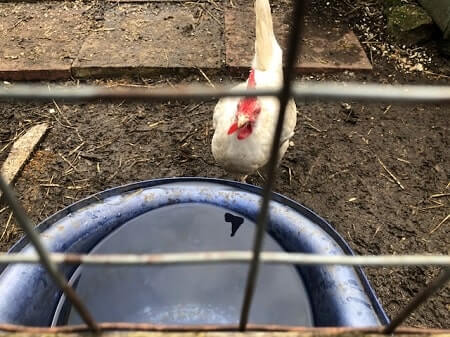This post may contain affiliate links. Please read my disclosure for more info.
Trying to figure out how many waterers per chicken is the right amount to keep your flock hydrated?
The answer depends on how much water your waterers hold, what the weather conditions are, and some other smaller factors.
Here’s how you can work out how many waterers you need in and around your coop:
Table of Contents
How Much Water Does a Chicken Drink per Day?

Generally speaking, an adult hen will drink around a pint of water a day.
This can easily become two pints in the summer months and expect it to be a little higher the larger the hen.
This means, at a minimum you want to have at least one pint per chicken available from the morning and double in the summer.
How Many Waterers Do You Need per Chicken?
There are two parts to this question;
- How many waterers you need to allow easy access for your flock, and
- How many waterers are required to ensure you have enough drinking water available.
Waterers per Number of Chickens
Looking at the first part of this question, I’ve seen everything from one huge hanging waterer for 20+ chickens, to one small waterer per chicken.
The number of waterers you need comes down to common sense. If you have a huge flock of 20+ chickens, then you either need a waterer large enough or enough small ones that all 20 chickens can dip their beak into at the same time if needed.
Otherwise, you risk fights breaking out.
Waterers per Volume of Water
In regard to the second part of the question, you need waterers that hold enough water so that it doesn’t run out between topping up.
This means, for example, if you have a large hanging waterer that holds two gallons of water like this one from RentACoop on Amazon:

This will be sufficient for 8 chickens for a day, or 4 chickens for two days.
I say this because 2 gallons is the equivalent of 16 pints of water. A chicken will drink at least 1 pint a day, so I recommend having 2 pints of water available if you’re not topping it up throughout the day.
This model has 4 separate drinking devices. This means it’s perfect for four hens, but you could also stretch it to 6-8 hens without an issue.
A more common type of waterer is this style:

These are designed to allow a larger number of chickens to drink from them at the same time as they have a moat of water at the bottom.
This model holds 1.5 liters, which is 2.6 pints. That means, any more than two chickens per waterer and you’re likely to have to top it up before the evening.
In the summer, I know my flock would get through these in a hurry. I’d have one per three chickens and top them up halfway through the day to get an idea for how much they’re drinking.
I like this style of waterer, but the main drawback is that they can flick bits of dirt and bedding into the water. The hanging style is much cleaner, and there’s less to no chance of the water turning green or being contaminated.
Related - How to stop your chicken’s water from turning green.
Related Questions
How High Should a Chicken Waterer Be?
If you’re hanging a waterer you shouldn’t need it any higher than 6 inches off the ground.
Obviously, it depends on how big your chickens are. A comfortable height is usually beak height.
What Is the Best Type of Waterer?
This comes down to what you prefer and how much work you’re willing to put in.
The large hanging type of waterer I showed you above is probably better overall. You will not have to top it up as often and your chickens can’t flick dirt into the water.
There is more work involved in setting one up though, and they cost a little more. But it’s worth it in my opinion.
Do Chickens Only Drink Water?
Chickens only need fresh drinking water, yes. I’ve heard of some owners giving their flock some other drinks like juices and flavored water, but there is really no need.
Adding a little apple cider vinegar to their water is common practice. Apple cider vinegar is known to help kill germs that breed in water and helps promote better respiratory health.
Related - Do chickens like beer?
Image credits - Header photo by Karly Jones on Unsplash




